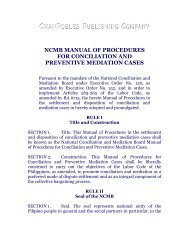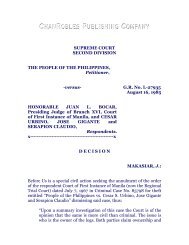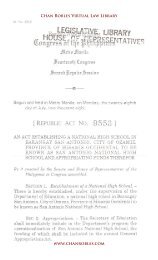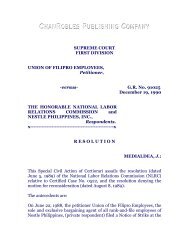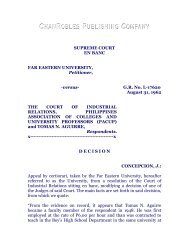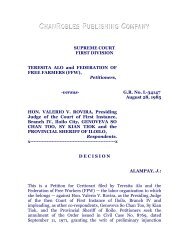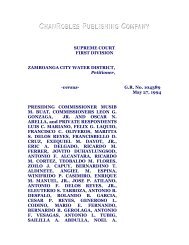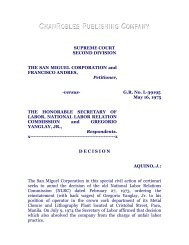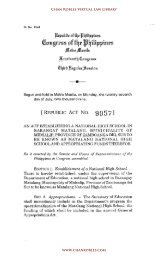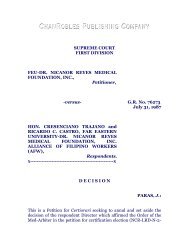part 2 - Chan Robles and Associates Law Firm
part 2 - Chan Robles and Associates Law Firm
part 2 - Chan Robles and Associates Law Firm
Create successful ePaper yourself
Turn your PDF publications into a flip-book with our unique Google optimized e-Paper software.
Pre-Week Guide on Labor <strong>Law</strong> 2006 Bar Examinations Prof. Joselito Guianan <strong>Chan</strong>increase from which the salary increases shall be charged. Also, the manner ofcomputing the net incremental proceeds was yet to be agreed upon by the<strong>part</strong>ies.“Petitioner insisted that a new collective bargaining agreement wasconcluded through the conciliation proceeding before the NCMB on all issuesspecified in the notice of strike. Although it is true that the university <strong>and</strong> theunion may have reached an agreement on the issues raised during the collectivebargaining negotiations, still no agreement was concluded by them because,among other reasons, the DOLE Secretary, who assumed jurisdiction on January23, 1995 only was set to resolve the distribution of the salary increase of thecovered employees. The Court of Appeals found that ‘there are many items inthe draft-CBA that were not even mentioned in the minutes of the July 20, 1994conference.’“Considering the <strong>part</strong>ies failed to reach an agreement regarding certainitems of the CBA, they still have the duty to negotiate a new collectivebargaining agreement in good faith, pursuant to the applicable provisions of theLabor Code.”125. Can a CBA be negotiated <strong>and</strong> concluded during suspension of operation?There is no legal basis to claim that a new CBA should not be entered into or thatcollective bargaining should not be conducted during the effectivity of a temporary suspension ofoperations which an employer can lawfully do under Article 286 of the Labor Code. In theabsence of any other information, the plain <strong>and</strong> natural presumption is that the employer wouldresume operations after six (6) months <strong>and</strong>, therefore, it follows that a new CBA will be neededto govern the employment relations of the <strong>part</strong>ies, the old one having already expired.Consequently, it was held in San Pedro Hospital of Digos, Inc. vs. Secretary of Labor,[G. R. No. 104624, Oct. 11, 1996, 263 SCRA 98], that while the employer cannot be forced toab<strong>and</strong>on its suspension of operations even if said suspension be declared unjustified, illegal <strong>and</strong>invalid, neither can the employer evade its obligation to bargain with the union, using thecessation of its business as reason therefor. For, as already indicated above, the employeremployeerelationship is merely suspended (<strong>and</strong> not terminated) for the duration of the temporarysuspension. Using the suspension as an excuse to evade the duty to bargain is further proof of itsillegality. It shows abuse of this option <strong>and</strong> bad faith on the <strong>part</strong> of the employer. And since itrefused to bargain without valid <strong>and</strong> sufficient cause, the DOLE Secretary, in the exercise of hispowers under Article 263 [i] of the Labor Code to decide <strong>and</strong> resolve labor disputes, properlygranted the wage increase <strong>and</strong> imposed the union shop provision.126. Can a CBA be negotiated <strong>and</strong> concluded in case of closure of business?An employer which has already decided to close shop cannot be compelled to enter into anew CBA. The Supreme Court said in the same case of San Pedro Hospital [supra] that it cannotimpose upon the employer the directive to enter into a new CBA with the union for the verysimple reason that to do so would be to compel the employer to continue its business when it hadalready decided to close shop, <strong>and</strong> that would be judicial tyranny on its <strong>part</strong>.127. Can a CBA proposed by the union be imposed lock, stock <strong>and</strong> barrel on employer whorefused to negotiate a CBA?The Supreme Court, following the provision of Article 253 which imposes on both<strong>part</strong>ies to keep the status quo <strong>and</strong> to continue in full force <strong>and</strong> effect the terms <strong>and</strong> conditions ofthe existing agreement during the 60-day period [prior to its expiration date] <strong>and</strong>/or until a newagreement is reached by the <strong>part</strong>ies, has lately consistently ruled that the CBA, as proposed bythe union, may be unilaterally imposed on the employer in the event the latter fails to dischargeits duty to bargain collectively by refusing to make any counter-proposals to the proposals of theunion or engaging in bad faith bargaining.Article 253 basically m<strong>and</strong>ates the <strong>part</strong>ies to keep the status quo while they are still in theprocess of working out their respective proposals <strong>and</strong> counter proposals. The general rule is that48


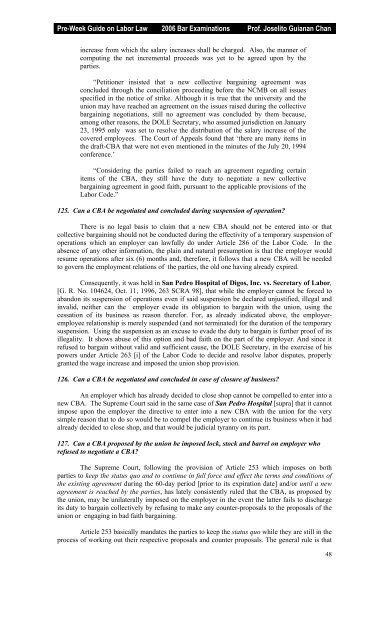
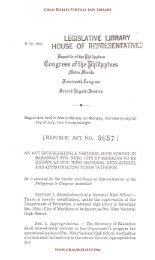
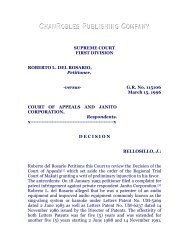
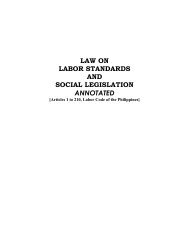
![Aurelio vs. NLRC, (221 SCRA 432 [1993]) - Chan Robles and ...](https://img.yumpu.com/51280528/1/190x245/aurelio-vs-nlrc-221-scra-432-1993-chan-robles-and-.jpg?quality=85)
